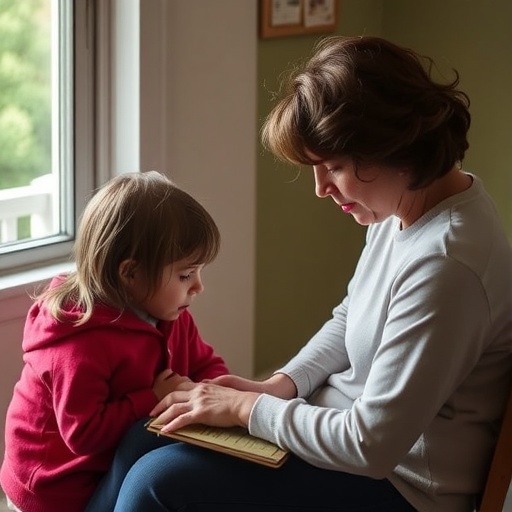In recent years, the psychological well-being of parents caring for children with special needs has garnered increasing attention from researchers and mental health professionals alike. A pioneering study published in BMC Psychology by Kaytez, Deleş, and Aral offers profound insights into the complex interplay between hopelessness and self-esteem among this population. Their work highlights the emotional and cognitive challenges faced by these parents, shedding light on crucial factors that influence their mental health outcomes and quality of life.
The emotional landscape for parents of children with special needs is often fraught with uncertainty, stress, and psychological strain. The study meticulously investigates how levels of hopelessness, a state characterized by feelings of despair and futility, correlate with self-esteem among these parents. Self-esteem, understood as one’s overall sense of self-worth and personal value, emerges as a pivotal element in coping mechanisms and psychological resilience. The authors’ findings suggest that diminished self-esteem may exacerbate feelings of hopelessness, creating a feedback loop that further destabilizes mental health.
A key aspect of the study lies in its methodological rigor. Utilizing standardized psychological assessment tools, the researchers measured hopelessness and self-esteem in a sizable cohort of parents raising children with various special needs conditions. This approach allowed for a nuanced analysis that takes into account demographic variables such as age, socio-economic status, and the nature of the child’s disability. The research design supports robust statistical validation, lending credibility and generalizability to the outcomes.
One particularly striking finding is the variability in psychological responses depending on the type and severity of the child’s special needs. Parents of children with more severe cognitive or physical disabilities tended to report higher levels of hopelessness. This observation underscores the impact of caregiving demands and the relentless nature of certain disabilities on parental mental health. Moreover, the study explores how social support systems — or the lack thereof — modulate these psychological factors, revealing that stronger social networks serve as protective buffers reducing hopelessness.
The implications of these findings extend beyond academic interest, speaking directly to clinical practice and public health policies. Mental health services geared toward these parents must account for the intertwined nature of hopelessness and self-esteem. Developing targeted interventions that bolster self-esteem may, in turn, alleviate hopelessness and improve overall psychological well-being. The study advocates for integrated care models that include counseling, peer support, and psychoeducational programs tailored to this vulnerable group.
From a neuropsychological perspective, the study opens avenues for exploring how chronic stressors associated with caregiving shape brain function and emotional regulation. Chronic feelings of hopelessness are known to correlate with dysregulated stress hormone levels and altered neural circuitry, including regions implicated in mood regulation such as the prefrontal cortex and amygdala. By establishing a psychological baseline, the research sets the stage for future neurobiological investigations into how caregiving environments affect parental brain health.
Societally, the research challenges longstanding stigmas around parenting children with special needs. By scientifically documenting the psychological toll, it redefines the narrative from one of mere sympathy to a call for systemic change. The study underscores the necessity of inclusive policies that provide financial, social, and psychological assistance to parents, recognizing their critical role in child development and societal cohesion.
The authors also delve into gender-specific trends, noting subtle yet significant differences in hopelessness and self-esteem between fathers and mothers. While both experience distress, mothers often report higher psychological burdens, possibly reflecting cultural expectations and caregiving roles. This gendered analysis emphasizes the need for tailored interventions that address unique psychosocial dynamics within families.
Further, the study examines temporal changes, acknowledging that levels of hopelessness and self-esteem are not static but fluctuate with factors such as child development stages and external life events. Parents may experience critical periods where psychological support is particularly essential, such as during diagnosis, school transitions, or health crises.
Crucially, Kaytez and colleagues highlight resilience mechanisms intrinsic to many parents, noting how some maintain fairly stable self-esteem despite formidable adversities. This resilience is attributed to factors including optimism, problem-solving abilities, and community engagement. Understanding these protective traits could guide strengths-based therapeutic approaches.
Technological advances in psychological assessments play a pivotal role in this research. The use of digital questionnaires and real-time data collection enabled comprehensive and reliable data acquisition, facilitating complex statistical modeling. Such innovations enhance the precision of measurements and could revolutionize future studies in parental mental health domains.
The viral potential of this research lies in its humanistic resonance combined with technical sophistication. It presents a relatable yet scientifically grounded narrative about everyday heroes — parents of special needs children — navigating a treacherous emotional landscape. Its call for empathy and action strikes a chord in both professional and public spheres, encouraging discourse on mental health destigmatization.
Moreover, the study’s interdisciplinary implications reach into educational psychology, social work, and healthcare delivery systems. By informing those who design interventions and policies, it contributes to a holistic approach to family-centered care, promoting sustainable support infrastructures.
In summary, this seminal investigation provides a detailed and multifaceted understanding of how hopelessness and self-esteem interrelate in parents caring for children with special needs. Kaytez, Deleş, and Aral’s contribution is a beacon for ongoing research and clinical advancements. Their work underscores the urgency of acknowledging and addressing the psychological challenges faced by these parents, ultimately striving for improved mental health outcomes and societal inclusion.
Subject of Research: Psychological well-being, hopelessness, and self-esteem among parents of children with special needs.
Article Title: An examination of the hopelessness levels and self-esteem of parents with special needs children.
Article References:
Kaytez, N., Deleş, B. & Aral, N. An examination of the hopelessness levels and self-esteem of parents with special needs children. BMC Psychol 13, 832 (2025). https://doi.org/10.1186/s40359-025-03194-x
Image Credits: AI Generated




